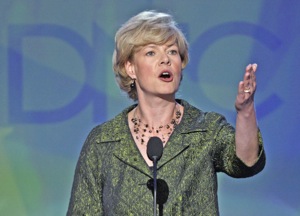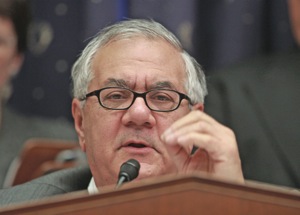-
- Transgender prostitute slain in Memphis shadows
- Iowa Supreme court to hear same-sex marriage arguments
- Poll: Calif. same-sex marriage ban driven by religion
- Star-studded video protests anti-same-sex marriage vote
- Fired University of Toledo administrator sues school
- Too early to know if Mo. school had HIV outbreak
- National News Briefs
- World News Briefs
feature
Where are we headed?
Leaders discuss national priorities and strategy for the GLBT rights agenda
Published Thursday, 11-Dec-2008 in issue 1094
WASHINGTON, D.C. – There will be real gains for the gay, lesbian, bisexual and transgender community under the administration of President-elect Barack Obama – and real caveats too.
“Things may happen later than we want and in different packages than we expect,” predicts Elizabeth Birch, former president of the Human Rights Campaign.
Birch’s premonition was echoed by various people throughout last weekend’s Gay & Lesbian Leadership Conference in Washington, D.C., a gathering of 600-plus GLBT elected officials and activists.
The consensus among participants seemed to be this: The strategy of a big push behind one or two pieces of Congressional legislation is not as likely to reap tangible results as quickly as a strategy of quiet, methodical work within the new president’s own priorities. And while President-elect Obama’s priorities – the economy, health care, tax cuts to the middle class and national security – may not seem to dovetail naturally with the GLBT movement’s priorities, leaders meeting this past weekend said the areas of overlap are easy to find.
Current HRC President Joe Solmonese told one workshop audience, for example, one of the movement’s first efforts under the new administration should be eradicating the unfair tax gay employees must pay when they include their same-sex partners or spouses under their health coverage. Under federal law, the value of that health benefit is not added to the straight employee’s gross income before assessing his or her tax bite. But for a gay employee, the fair market value of that health coverage is added to the gross income on which the employee must pay taxes. (The Center for American Progress and the Williams Institute estimate that a gay employee pays more than $1,000 per year more in taxes because of that disparity.)
Solmonese pointed to HRC’s successful effort two years ago to use a pension reform bill to change federal law to allow a surviving same-sex partner to inherit a 401(k) the same as a married spouse – to roll it into their own retirement account without paying taxes on it.
U.S. Rep. Tammy Baldwin (D-Wisc.), speaking to a luncheon audience Friday, predicted many important advances toward GLBT equality would come through such means as presidential executive orders and changes in departmental policies. One such executive order she said she hopes for is one that prohibits contractors hired by the federal government from discriminating based on sexual orientation.
Activists in specific areas had similar ideas about how improvements for GLBT people can be accomplished by President Obama acting independently or through specific departments. Paula Ettelbrick, head of the International Gay and Lesbian Human Rights Commission, said with the appointments of U.S. Sen. Hillary Clinton to head the Department of State and Susan Rice to be the U.S. ambassador to the United Nations, she hopes to see a stronger push for including GLBT groups at the U.N. She said she also hopes the U.S. will take a stronger leadership position around the world in the fight against HIV and anti-gay violence. Valerie Wagner of AIDS Project Los Angeles said she hopes to see more funding for HIV programs and less for anti-gay community organizations which have been using President Bush’s “faith-based initiative” to promote anti-gay initiatives.
But while much of the discussion about what to do to advance GLBT equality in the new administration envisioned a studied, patient incremental approach, the “big four” legislative goals are still very much on the movement’s agenda, said Rea Carey, executive director of the National Gay and Lesbian Task Force. Those are the Hate Crimes Prevention Act, the Employment Non-Discrimination Act (ENDA), the repeal of the “Don’t Ask, Don’t Tell” law against gays in the military, and repeal of the anti-gay Defense of Marriage Act (DOMA).
“We just want to make sure that, whenever our issues come up, we’re successful,” Carey said. Carey and others predicted that hate crimes would probably be the first major bill up for the GLBT community under the new administration.
Random predictions throughout the conference suggested that, while the hate crimes bill (including gender identity) might have a chance of passing in 2009, other bills would likely have to wait a little longer. A gender identity inclusive ENDA might have a chance at passing in two years, predicted one panel; repeal of “Don’t Ask, Don’t Tell” will likely have to wait until after mid-term elections. And the repeal of DOMA may be something that will have to be accomplished through small steps over the course of four or more years.
U.S. Rep. Barney Frank (D-MA), in his remarks at a luncheon on Saturday, struck an optimistic note about the chances of passing fully inclusive versions of the hate crimes and ENDA bills, saying that much work has been done since last year to lay the necessary groundwork. Just one year ago, Frank resisted efforts to insist upon a fully inclusive ENDA, saying not enough education had been done on the gender identity aspect of the bill. The bill passed the House but included only sexual orientation and was not taken up by the Senate.
One thing the GLBT community won’t have to worry about in Washington in 2009, said Frank, is anti-gay legislation. The anti-gay Federal Marriage Amendment, he said, “won’t even come up.” That is, of course, because the Democratic Party has an increased majority in both chambers of Congress and strong supporters in the leadership. Frank said GLBT people are no longer “a group on the outside” but a “major part of the governing coalition of this country.”
“We’re also a lot more sophisticated and have a lot more talent than we did 16 years ago,” said Tim McFeeley, who headed up HRC in 1993 as the first term of President Bill Clinton began. That’s when the GLBT leadership put the repeal of the military’s policy excluding gays at the top of its wish list for the new administration only to watch conservative forces hijack the issue to undermine the new president’s clout and codify the ban. The community’s focus back then, said McFeeley, should have been AIDS, not the military.
This time, said McFeeley, “We should decide our own priorities. We shouldn’t always be playing defense in [the right-wing’s] game.”
Another difference this time around, said McFeeley, is the size of the GLBT community’s pool of leaders. In 1993, he said, “there were maybe 300” GLBT people actively seeking appointments to the Clinton administration. This year, the Gay & Lesbian Leadership Institute has reported more than 1,300 applications for its presidential appointments project.
“Appointments should be our first focus,” said Jay Fisette, a conference attendee and elected official from Arlington, Virginia. “We need to be at the table” in the Obama administration. Having openly gay appointees, he said, “gives us a voice to the administration and keeps us informed about LGBT issues in the administration.”
During the conference, more reports were being circulated about who might be in a position for a major appointment. Among those mentioned were longtime gay Democratic activist and businessman Fred Hochberg (for administrator of the Small Business Administration) and National Zoo Director John Berry (as Secretary of Interior).
There was discussion, too, of the changes occurring in the GLBT political landscape. Conferees were presented Friday with the results of the summary of a Harris Interactive poll survey of adults conducted in mid-November and released Dec. 3. The summary found that only one percent of 2,008 people surveyed in mid-November considered “gay and lesbian issues” to be the “most important issue facing America,” but 19 percent said their feelings towards gay and lesbians had grown “more favorable” during the past five years.
Meanwhile, some non-GLBT related issues emerged in discussions even though they weren’t explicitly on the conference agenda. A front-page story in The Washington Blade, distributed at the conference, reported there has been a significant decrease in funding for national gay political and legal organizations, with significant repercussions. Lambda Legal Defense, the largest national gay legal group, reportedly cut 10 employees – or 10 percent of its staff – last month. The Gay and Lesbian Alliance Against Defamation cut nearly that many and The National Gay and Lesbian Task Force has not moved to fill any of its recent vacancies.
GLAAD executive director Neil Giuliano said contributions from both middle income donors and “big rollers” have dropped off in reaction to the nation’s economic slowdown.
And California’s Proposition 8 – a ballot initiative passed Nov. 4 that amends the state constitution to ban same-sex marriage – was mulled over in nearly every panel. Some participants, such as Gill Action Fund National Political Director Bill Smith, said it was wrong to blame the passage of Proposition 8 on black voters, as some news reports have suggested. Instead, he said, the effort to defeat the measure was crippled by “trying to do multi-year work in a short-term campaign.”
California State Assembly Member John Perez agreed, saying the loss could be faulted at least in part on the GLBT community’s failure to “invest in building real relationships with communities of color.”
A number of speakers at the conference said the anti-gay movement considers same-sex marriage its best battleground.
“Marriage is at the outer end of what we can do with mainstream people,” said Steve Elmendorf, who was a deputy campaign manager for Democratic presidential candidate John Kerry in 2004. “The right wing picked it.”
But for all the movement’s challenges and difficulties, noted Rep. Baldwin, in her remarks to the gathering, “there is a new optimism for LGBT people, led by a president who understands and embraces diversity in people and opinions.”
|
|
Copyright © 2003-2025 Uptown Publications



